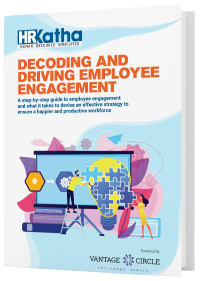11 Tips For Better and Positive Work Performance

We have seen Neil Armstrong, Buzz Aldrin, and Michael Collins reach for the moon and achieve the unthinkable. It seemed impossible, but they made it a successful mission, which at first seemed like a distant goal.
But how did they do it?
When you think of the success, it was a joint effort that put their names in the history books. It was a result of their sheer determination, dedication, and hard work at their workplace.
From this success story, we can deduce that giving your best performance will help achieve your goals. Similarly, your work performance plays a crucial part in helping your organization fulfill its business goals.
This article will give you a brief idea about what work performance is.
What is Work Performance?
When an employee is assigned a task, you would want them to execute it in the best possible way. And as a manager, you would assess their work at your annual performance evaluation.
Work performance is the process of carrying out or accomplishing an action, task, or function. Your employee can achieve the expectations of your company.
But there is a catch to it. People often confuse performance with productivity, whereas both are different concepts.
Productivity is defined as the amount of work your employee did on a particular day, irrespective of the quality. However, performance is something that you need to work on day in and day out to get the best result and, at the same time, make room for improvement.
Below are a few tips that you and your employees can adapt to improve work performance at your office.
Tips to Improve Work Performance:
1. Setting Up Milestones:
Setting up milestones helps you visualize a clear path towards your goals both in your professional and personal life.
Your work performance and productivity take a hit when you don't have any goals or objectives to look forward to. So, focus on setting your goals and how you want to fulfill them.
Once you complete your target, no matter how big or small it may be, it will boost your confidence and performance levels.
2. Prioritizing:
While assigning your employees a big project, ask them to break it down into smaller pieces and prioritize status accordingly.
You and your employees can combine the most urgent and essential tasks when sharing a big project into sections, considering the amount of time it will take to finish.
Doing this will also help in scheduling further work for the next day.
With limited working hours, your employees' to-do list must be in such a way that they establish realistic goals.. This is going to help clear any cloud of doubts that will make your head go scratching.
3. Dropping the idea of Multitasking:
The concept of multitasking is an unrealistic ideal that we often set to become more productive at work.
But instead of improving productivity, it has the opposite effect. According to studies, multitasking leads to as much as a 40% drop in productivity.
That is a huge number and a serious issue that needs to stop. Multitasking reduces concentration and leads to mistakes hampering your performance. Thus, leading to frustrations, and employees getting succumbed to burnout. Do try to avoid that.
But if you focus on one work at a time, not only will your quality improve, but you will be less stressed, and your work performance will improve.
4. Finishing up the pending work:
Do not let yourself and your employees pile up the work week after week. Instead, curate a schedule that will allow them to keep track of the task at hand.
This schedule will also help set the time required to complete the task and keep a checklist of what needs to be done and what not during the working hours. Thus, improving overall performance by allowing employees to achieve their goals in the set time.
5. Communication:
Communication in the workplace is a two-way affair. It is a bridge that needs to be built between employees and their leaders.
Whenever you're uncertain about your work or a task, feel free to ask anyone. Whether you are a manager or an employee, make sure to establish a coherent communication channel among your team members.
It will help you and your employees evaluate the task more quickly. It will give you the window of opportunity to work on improvements.
6. Taking Breaks:
It is not always possible for you to perform at your peak or be productive every day. The reason for this might be increased workload, long working hours, and so on. Admitting you need a break means you are well aware of your limitations.
There has been a significant increase in burnout levels and stress in the workplace. The more you push yourself to complete a job within a limited period, the more likely your quality of work will decrease.
To avoid such situations, try to take breaks whenever you feel stressed or you feel like you are in dire need of one.
7. Working on weak spots:
We all have our share of strengths and weaknesses. But being aware and mindful of what your weak spots are will allow you to identify improvement opportunities.
Your weaknesses hold you back from performing. But recognizing areas where you lack and taking conscious steps to work on them will enhance your performance. Settling for an average score is never enough when you can be the best in what you do.
8. Avoiding Distractions:
The worst enemy of performance? Distractions. You can get distracted in several ways at the workplace.
Distractions can be in various forms, like your colleague interrupting your work, browsing through your phone, glancing through youtube once in a while, and many more.
Before you try to give in to these distractions, just keep in mind what is at stake and how it will hamper your performance growth.
Learn to say 'no' during work hours and keep your phone away from your desk if time-consuming. Also, you can use one of those noise-canceling headphones to eliminate background noise, such as people talking or nearby construction work. Moreover, you can opt for meditation if you find yourself too caught up in distraction so that you can channel your mind towards your work.
9. Read a lot:
The great minds and leaders always advise us on how important it is to read or how beneficial the habit of reading is. Reading gives us new perspectives, and it helps to see things more clearly.
We tend to waste a lot of our time on the internet or social media or involved in activities that do not help us in the long run. If you consciously introspect, you would realize how these habits waste your time and kill your enthusiasm and spirit and eventually your work efficiency.
Why not develop a habit which not only keeps you occupied but at the same time gives you plenty of knowledge.
Read to stay on top with industry news, articles, or books related to your niche. Also, you could try out novels that interest you. By doing so, you are most likely to improve your work performance because you will increase your knowledge with every new thing you read.
10. Being Punctual:
Your tight schedule might get disrupted if you are not able to reach your work in time. When you arrive late to your scheduled meeting, your next commitment gets delayed. Eventually, all your work starts piling up. It can cause stress and may even lead to burnout.
But if you are punctual, you will maintain your schedule and reduce stress by completing your task in time. Thus, leading to better performance at work.
11. Stop Procrastinating:
We often get this tendency to be inactive, procrastinate, and keep our tasks for a later date. That is a thing you should avoid because it will hamper your morale and give a bad image in front of your peers.
If you don't feel like working at all, take a break and follow up with your work once. Then build on from where you left. This way, you will complete your work, and you will get confidence for your next task.
Summing it Up:
A good manager achieves their goals with great employees. But a great manager figures out how to bring the best in underperforming employees.
With the increased levels of stress and burnout levels, it has become important for the employees to stay rejuvenated. Work performance matters to have a breakthrough in their personal and to have job satisfaction.
These are just a few strategies to tackle the problem of underperforming but it depends solely on how you improvise and apply it in your organisation.

Vantage Circle is a simple AI-powered Rewards & Recognition Platform for upgrading your employee experience and engagement for better productivity.






